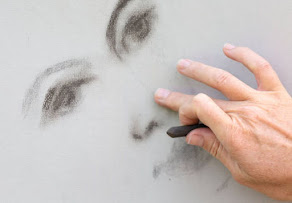Sunday, October 25, 2020
Now You See Him….
He liked this place. He didn’t have to think or plan or worry or anything. Things happened around him, but nothing touched him. He could just be. He liked that. That was good.
Mariana drove her car carefully into the preschool/daycare parking lot. She always drove slowly to her assigned spot, as she knew that the children could pop up in unexpected places, even though they were supposed to walk directly to the front door with an adult.
It was raining that winter morning, which slowed her even more—but the children were easier to see, with their mini umbrellas: striped ones, clear ones, ones that looked like ladybugs or yellow ducks. But wait, there was one child without an umbrella, walking with a man. Oh, wasn’t that Riley? The man was wearing a raincoat and carried an umbrella, but Riley had neither. He was getting wet…well, maybe he had some extra clothes in his cubby. She watched them go through the front door.
She parked her car, stepped out and slipped on her raincoat, and gathered her school materials for the day. She was just starting out in her teaching career, so she brought a lot of things with her every day, in case she needed to use them. Mariana walked toward the front door with her arms full.
It was raining again, but not too much this time. His clothes had gotten a little wet during the walk from the car to the school. He didn’t have a raincoat or an umbrella. An umbrella would be fun to have. He’d like a clear one, so he could see all around. Or maybe not clear, so no one could see him. He couldn’t decide. Now he sat on a wooden chair near a window in the big room, looking out at the rain. He didn’t worry about wet clothes. They would dry before someone came to pick him up. He wouldn’t get in trouble for that.
At the school, Mariana helped with the oldest children. Their classroom was in a modular unit, across the play yard from the main building. All the other classes were in the big building, which also had the front entrance, office, bathrooms, and kitchen. Every morning she walked through the larger building to punch in, check on staff messages, and say hello to the teachers and children who had arrived earlier. She wasn’t very familiar with the younger children, although she was getting to know a few of them. Like Riley, for example. He was always there before her, from early opening time in the morning until late in the day, after she left. Five days a week, always quiet. Because of that quietness, she hadn’t really noticed him right away.
Sometimes he turned off his thinking in this place. It gave him a chance to rest. He liked his classroom—it had all the sorts of things in it that he was used to. This big room, too. His teacher didn’t pay much attention to him, which was good. He wanted to be left alone. The other children left him alone. He didn’t even look at the teachers or the other children. As long as he followed directions and didn’t bother anyone, nobody would bother him. That was predictable. The only people he looked at were his mother and his father. He had to watch them all the time.
Maybe it was time for his puzzle again…
She thought more about Riley as she punched in with her time card. His was an unnatural quietness, withdrawn and colorless. He didn’t play with other children (that she had observed). He wasn’t physically active, but mostly sat at a table with a puzzle or a book. His clothes looked okay at first glance, but always turned out to be torn, or grimy, or inadequate for the weather. She turned to look at him—yes, his clothes were too lightweight for the cold and wet weather today; and as they were still wet, he obviously didn’t have extra clothes, or no one had bothered to look for them. Riley didn’t speak much, and never responded to a friendly greeting. She knew—she had tried a few times. She had never met his parents, knew nothing about them. He always seemed to just “be there”.
He looked at the wooden puzzle he had pulled out from the bottom of the stack. There were some smiling children sitting around a teacher, who was reading to them. He put out his finger and touched one child’s image. Then he took all the face pieces out of the puzzle and laid them on the table, all lined up. Then he turned back to the puzzle with the faces missing. He looked at that for a long time.
During the next few weeks, Mariana found herself thinking about Riley often. She worried about him, about his unusual behavior, about his questionable physical condition, more and more. She even began to wonder if she should make a report to Child Protective Services. She knew she was required to do that if she suspected something like neglect or abuse. It would be a bold step—the owner-directors of the school would not be pleased if she made a report and they had to deal with legalities and inspections and interviews, no matter how it turned out. Even if there was abuse, they would not be happy with her at all; they might even fire her. She carried on an internal debate with herself for days, trying to weigh the pros and cons of any actions…or inactions. In the meantime, Riley never changed one way or another, which only made him stand out in her mind even more. It was like he was frozen: frozen in time, frozen in emotions, frozen in existence.
His eyes flicked up and then back down to his favorite puzzle lying in front of him. That lady was looking at him again. He didn’t know her; she wasn’t his teacher. She worked in another room. He wished she would stop hanging around him. He wished she would leave him alone. She was a teacher, but she wasn’t acting predictably. She worried him. He didn’t like it when people did unexpected things. He had enough of that at home.
Thoughts of Riley started to bother her night and day, to the point of feeling very uneasy about it. She asked his teacher indirect questions about him, but that woman was clearly only there to do a job; she was far too interested in her personal life to be focused any more than she had to be on the children in her class. Finally, Mariana asked her point-blank how Riley’s parents treated him, how he acted around them, how he behaved in class. That seemed to catch her colleague’s attention. The immediate feedback was inconclusive, but apparently her questions may have started a train of events.
Something was going to happen. He felt agitated and apprehensive. He raised his eyes from his favorite puzzle and looked around the big room. It had been good here. He would miss this place.
Over the weekend, Mariana definitely made up her mind to call Child Protective Services the next work day. She arrived at the school on Monday morning and went into the big playroom. As she punched in, she looked around—and realized that Riley wasn’t there. She scanned the room intentionally, from one end to the other, and then asked the teacher on early care duty where he was. “Oh, his parents pulled him out of the school,” was the answer she received. Mariana was stunned. “Why did they do that? Did they move or something? Did he say good-bye to his class?” she asked. The other teacher shrugged. “I don’t know anything about it. I don’t think they gave a reason. He’s just gone.”
Mariana walked off in a random direction, unable to think clearly. Her mind was full of questions, concerns, guilt, fear. She ended up standing in front of the puzzle table where Riley often played. She sat down and stared at the stacks of puzzles on the table and the nearby shelf. Gradually, she realized that something wasn’t “right” about the puzzles—no, just with one puzzle, an old-fashioned wooden one with a teacher reading to a group of children. There was an empty space, a missing piece. She looked under the puzzle, around the others, and on the floor, but couldn’t find it.
The face of one of the children was missing.
She looked at that for a long time.
(copyright 2019, Mary M. Isaacs)
Subscribe to:
Post Comments (Atom)









No comments:
Post a Comment